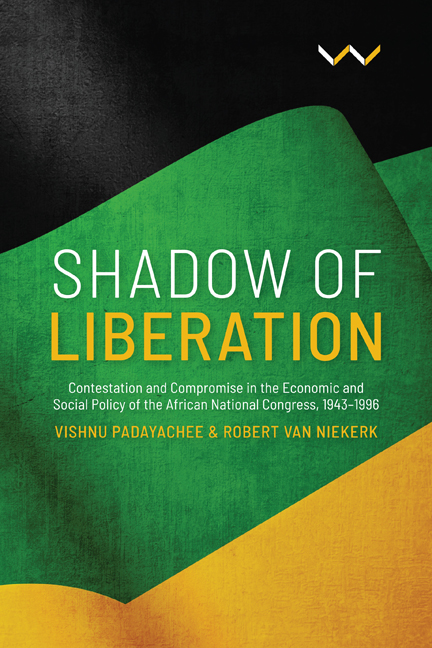 Shadow of Liberation
Shadow of Liberation Book contents
- Frontmatter
- Contents
- Acronyms and abbreviations
- Preface
- Acknowledgements
- Chapter 1 The Context of Economic and Social Policy-Making in the ANC
- Chapter 2 African Claims, the Freedom Charter and Social Democracy, 1943–1960
- Chapter 3 Incarceration, Exile and Homecoming, c.1960–c.1991
- Chapter 4 Economic Policy Debates during a Decade of Liberation, 1985–1993
- Chapter 5 On the Way to GEAR, 1994–1996
- Chapter 6 Making Sense of the Economic Policy Debates
- Chapter 7 South African Reserve Bank Independence
- Chapter 8 The Politics of Health Policy-Making in the Transition Era, 1990–1996
- Chapter 9 Interpretation and Conclusion
- Notes
- Bibliography
- Index
Chapter 4 - Economic Policy Debates during a Decade of Liberation, 1985–1993
Published online by Cambridge University Press: 20 January 2022
- Frontmatter
- Contents
- Acronyms and abbreviations
- Preface
- Acknowledgements
- Chapter 1 The Context of Economic and Social Policy-Making in the ANC
- Chapter 2 African Claims, the Freedom Charter and Social Democracy, 1943–1960
- Chapter 3 Incarceration, Exile and Homecoming, c.1960–c.1991
- Chapter 4 Economic Policy Debates during a Decade of Liberation, 1985–1993
- Chapter 5 On the Way to GEAR, 1994–1996
- Chapter 6 Making Sense of the Economic Policy Debates
- Chapter 7 South African Reserve Bank Independence
- Chapter 8 The Politics of Health Policy-Making in the Transition Era, 1990–1996
- Chapter 9 Interpretation and Conclusion
- Notes
- Bibliography
- Index
Summary
This chapter and the next lie at the heart of our project in so far as they relate to the key economic debates during the transition to democracy. Drawing on the long history of policy debates that we have traced in previous chapters, we try to make sense of what transpired in the economic policy debate in the crucial first half of the 1990s. For something did unfold, but what exactly, and why? Was the policy shift away from the ANC's traditional values the result of some grand conspiracy by a small elite in the ANC bent on selling out the legacy of African Claims and the Freedom Charter? Or was it the outcome of a rather chaotic, messy and haphazard unfolding of events under conditions of pressure, where an underprepared ANC leadership was outmanoeuvred by the still well-resourced economic institutions of the apartheid state and by the local big business sector? Were the international financial institutions and Western governments the key influence? Or was it something else?
It would be naive to try to advance some kind of ‘mathematical weighting’ to all the factors that may explain what unfolded in the economic policy debate within the democratic movement in the 1990s. This book is not a ‘who done it’ mystery. Rather, our aim is to rely on our training as academics, our political instincts and our judgement to lay it all out before our readership, as we understand it and based on the available evidence we were able to secure. We use evidence from various public and private archives, from the growing number of recently published memoirs of leading ANC politicians, from other secondary sources and documents, and most importantly from dozens of in-depth interviews with key actors from across the political spectrum that have not been aired before in any coherent and systematic way.
Firstly, discussion of the evolution of ANC economic policy thinking in the 1990s and the perceived radical shift from the Reconstruction and Development Programme (RDP) to Growth, Employment and Redistribution (GEAR) cannot really be understood without some recognition of the economic policy changes that the National Party government had been instituting since the late 1970s. Secondly, we need to understand economic policy developments within the ANC Alliance as a whole, including in the Congress of South African Trade Unions (Cosatu) and the Economic Trends Research Group set up by Cosatu in the mid-1980s.
- Type
- Chapter
- Information
- Shadow of LiberationContestation and Compromise in the Economic and Social Policy of the African National Congress, 1943–1996, pp. 73 - 108Publisher: Wits University PressPrint publication year: 2019
